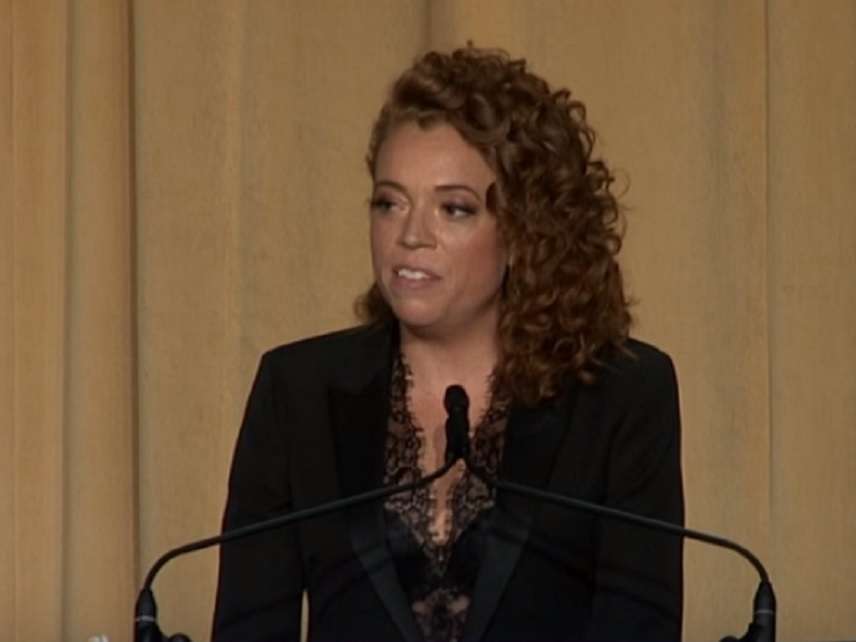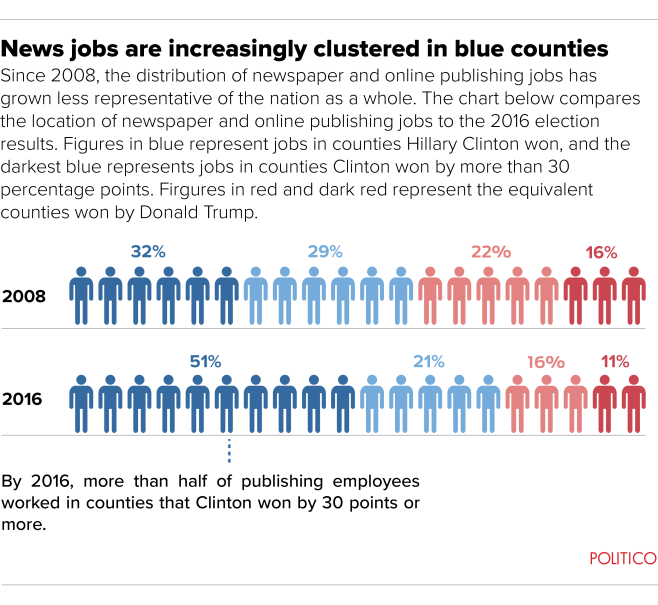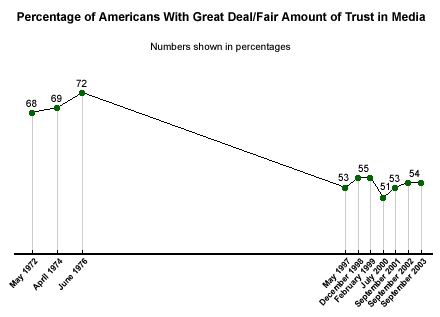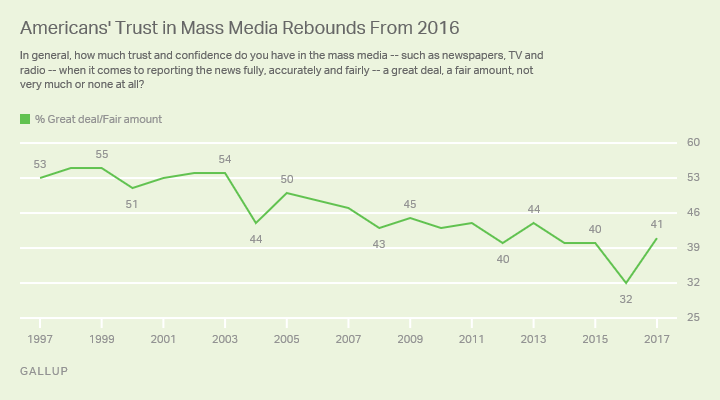Why America Distrusts 'the Media' and What to Do About It
For starters, don't describe the audience as incest survivors.

How bad is the relationship between national news outlets and their audience? I'll get to the survey data in a bit, but if you bothered to watch or read about last Saturday's White House Correspondents' Dinner, you already know the answer: It's really, really bad. And it's certainly not helped when wealthy, well-connected TV journalists side with powerful politicians against freedom of expression or when Brooklyn-based scribes imagine Americans as children and Donald Trump as "a stepfather who was going to rape us."
Whatever else you can say about comedian Michelle Wolf's polarizing performance at the correspondents' dinner, in which she brutally mocked the president in absentia and administration officials seated just a few feet from her, the press came off looking even worse. Within hours of the event, NBC stars such as Mika Brzezinski and Andrea Mitchell, newly minted Pulitzer Prize winner Maggie Haberman, and other prominent journalists attacked Wolf for her raw language and untoward humor, especially her jokes at the expense of White House Press Secretary Sarah Huckabee Sanders. So much for freedom of expression. Although the evening was explicitly framed as a celebration of the First Amendment, even the head of the White House Correspondents' Association (WHCA), which sponsors the event, regretted Wolf's appearance. Margaret Talev, whose day job is writing for Bloomberg, wrote:
Last night's program was meant to offer a unifying message about our common commitment to a vigorous and free press while honoring civility, great reporting and scholarship winners, not to divide people. Unfortunately, the entertainer's monologue was not in the spirit of that mission.
At best, the dinner, once celebrated and widely covered as the "nerd prom" to which journalists brought glamorous guests from Hollywood, was poorly organized. At worst, the quickness with which members of the press condemned an utterly predictable (and hence preventable) attack on the Trump administration reveals a deference to power and a desire to maintain access to politicians that far outweigh any watchdog role the Fourth Estate pretends to play.
To many in the US media, the worst sins aren't bombing and killing people or embracing policies that cause mass suffering. Those are often virtures ("tonight, Trump [by bombing] became our President"). The worst sin remains: breaching civility protocols to protect DC elites.
— Glenn Greenwald (@ggreenwald) April 30, 2018
What exactly is the "spirit of the night"? Journos who cover the White House schmoozing with people they cover as if it's all just a dumb game and adversarial journalism is just theater? https://t.co/ehEeui8hTs
— Elizabeth Spiers (@espiers) April 29, 2018
Greenwald, a winner of Reason's Lanny Friedlander Prize for exposing secret state surveillance and creating platforms that expand expression, and Spiers, the original writer at the defunct alternative outlet Gawker, aren't the only journalists who criticized the WHCA for the way its dinner played out. But the response from many establishment journalists only aggravates the alienation of readers, viewers, and listeners. The purest distillation of this perspective comes from Virginia Heffernan, whose résumé includes stints at The New Yorker, Slate, and The New York Times as well as regular contributions to Wired, The Wall Street Journal, and Politico. The correspondents' dinner contretemps moved Heffernan to tweet:
When Obama left the White House in a helicopter that horrible day, I had the impression our true father was leaving & the nation was stuck with a stepfather who was going to rape us. Now I increasingly believe that the media is the mother who won't stand up for us & defy him.
— Virginia Heffernan (@page88) April 30, 2018
It's magnanimous of a well-connected journalist with a Harvard Ph.D. to identify with the plebes ("…who was going to rape us"). But the implications of the metaphor are unmistakable: Regular Americans are children who are defenseless against a predator. "We" must be protected, either by President Dad or Media Mom, because we have no agency, no power, no strength of our own. Forget the fact that even though Trump was charged with sexual harassment and assault by many women, he won 2 million more votes than Mitt Romney managed; that must be evidence of a political-sexual Stockholm Syndrome. Trump has been repeatedly rebuffed by the courts and, from time to time, even by his own party in Congress. I have no love for him, but to cast Americans, including his supporters, as children incapable of independent action or thought only confirms the critique of the press as an elite that has more in common with D.C.'s political class than jes' plain folks toiling away at mundane jobs in flyover country.

Do most members of the media see their audience with this mixture of pity and contempt? Journalists do seem to be increasingly concentrated in the well-heeled, coastal enclaves that breed such attitudes. As Jack Shafer and Tucker Doherty wrote last year at Politico,
The national media really does work in a bubble, something that wasn't true as recently as 2008. And the bubble is growing more extreme. Concentrated heavily along the coasts, the bubble is both geographic and political. If you're a working journalist, odds aren't just that you work in a pro-Clinton county—odds are that you reside in one of the nation's most pro-Clinton counties. And you've got company: If you're a typical reader of Politico, chances are you're a citizen of bubbleville, too.
While newspaper jobs, which were scattered around the country among local dailies and weeklies, have been halved since 1990, online media jobs have grown. But these new gigs are clustered in just a few places. Shafer and Doherty explain:
Today, 73 percent of all internet publishing jobs are concentrated in either the Boston-New York-Washington-Richmond corridor or the West Coast crescent that runs from Seattle to San Diego and on to Phoenix. The Chicagoland area, a traditional media center, captures 5 percent of the jobs, with a paltry 22 percent going to the rest of the country. And almost all the real growth of internet publishing is happening outside the heartland, in just a few urban counties, all places that voted for Clinton. So when your conservative friends use "media" as a synonym for "coastal" and "liberal," they're not far off the mark.

Not so long ago, journalism was a trade that was open to high-school graduates. During the last several decades, writing for a living has been professionalized to the point that most journalists have a college degree and an increasing number have majored in journalism. That trend only increases the distance between news producers and news consumers.
All of this matters because the news media play a unique role in society. Earlier this year, the Knight Foundation released a report based on a national survey of 19,000 people. Among its findings:
More than eight in 10 U.S. adults believe the news media are critical or very important to our democracy. They see the most important roles played by the media as making sure Americans have the knowledge they need to be informed about public affairs and holding leaders accountable for their actions.

Yet respondents lacked confidence in print, online, TV, radio, and cable sources, with fully 66 percent agreeing that "most news media do not do a good job of separating fact from opinion." In 1984, the corresponding figure was 42 percent. Only 30 percent said the media did "well" or "very well" at holding leaders accountable, while 42 percent said the media performed this function "poorly" or "very poorly."
Nothing that's happened in the last week will inspire more confidence that the press is comforting the afflicted and afflicting the comfortable. Sadly, even when it tries to police and critique itself, the press seems likely to inflame the situation by insulting the intelligence and autonomy of its audience. Few industries do well by alienating their customers, and the media are proving no exception.
What can be done? In an age when newspapers and other sources that at least aspired to be "objective" are declining, the future belongs to viewpoint-driven journalism. That isn't a bad thing, even if it means that "the media" as a general category might never regain the public confidence it had in the mid-1970s, when 72 percent of Americans told Gallup they trusted the press. Objectivity has always been something of a con, since the selection of stories, of what counts as news and why, has always been hidden from view. So even a story that presents "both sides" can have an agenda despite its seemingly evenhanded approach.
Audiences are increasingly drawn to highly personalized and idiosyncratic approaches that emphasize drama, personality, and viewpoint. Podcasts represent the democratization of radio, and the most popular podcasts tend to be ones that push an agenda and have outsized personalities as hosts. Narrative journalism, blogging, and other popular forms don't hide behind the royal we or pretend to be omniscient. But if objectivity is elusive, impossible, and unattractive, that doesn't mean that basic codes of fairness and engagement shouldn't be front and center in contemporary journalism. Not misrepresenting opponents' viewpoints is a good a place to start, as is foregrounding biases and predispositions rather than hiding them. Admitting errors and correcting them in real time is a prerequisite, and so is engaging the audience, which long ago stopped being passive (if it ever was).
According to the Knight Foundation survey, Americans are split "on the question of who is primarily responsible for ensuring people have an accurate and politically balanced understanding of the news," with 48 percent saying it's up to individuals and 48 percent saying it's up to the media. Either way, Americans want trail guides to their world and what's happening in it, not infallible experts who issue ex cathedra statements with Pope-like certainty. They also want choice and variety and don't expect, say, the Associated Press to follow the same blueprint as Reason, even if they expect each of us to adhere to our missions and ethics. The turn to the "artisanal" matters every bit as much in journalism as it does in restaurants, woodworking, and crafts. People want to know what you believe, how your shit is sourced, and that they can trust you to live up to your word. That should come naturally, if not easily, to journalists.
Years ago, pioneering blogger Ken Layne notoriously proclaimed, "It's 2001, and we can Fact Check your ass." His specific target was Robert Fisk, a reporter whose last name was turned into a verb signifying a point-by-point refutation of an article or argument. Now it's 2018, and readers can still fact-check journalists' collective ass. They will respond more favorably to those of us who make it easy for them by being upfront, honest, and responsive without having to be asked first.


Show Comments (208)